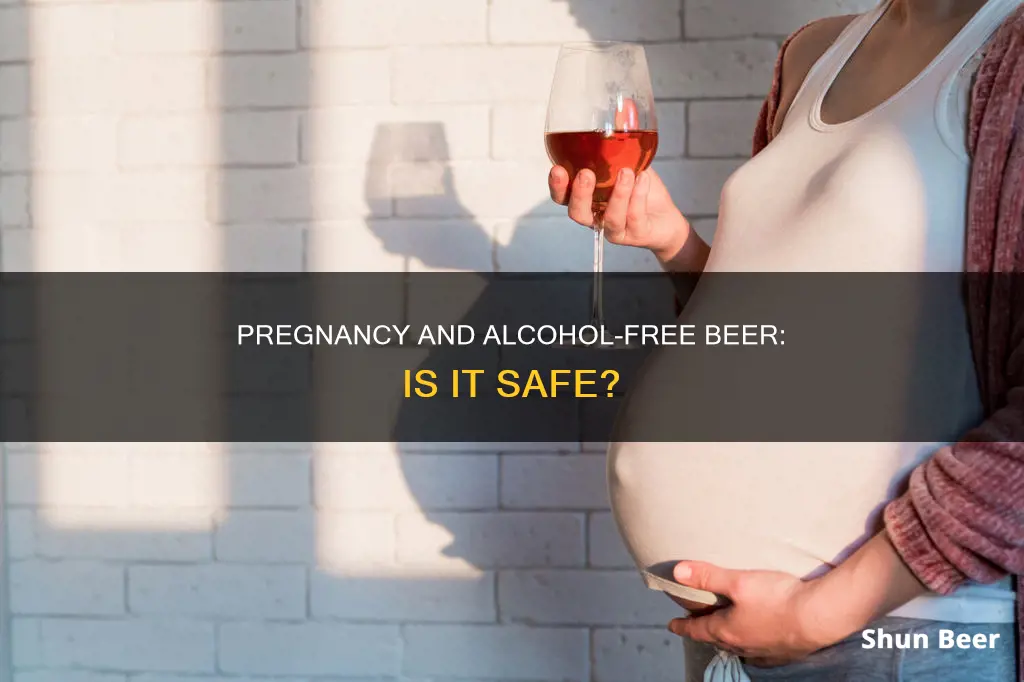
Pregnancy is a time when women are often faced with the challenge of abstaining from alcohol to ensure the health and well-being of their baby. With the emergence of non-alcoholic beer as a popular alternative, a common question arises: Can you drink non-alcoholic beer while pregnant? While non-alcoholic beer typically contains less than 0.5% alcohol by volume (ABV), it's important to understand the potential risks and make an informed decision. In this paragraph, we will explore the topic of consuming non-alcoholic beer during pregnancy, considering the safety aspects, the impact on fetal development, and the recommendations of healthcare professionals.
| Characteristics | Values |
|---|---|
| Definition | Beer with an alcohol-by-volume (ABV) content of less than 0.5% |
| Production | Brewed by removing alcohol from regular beer or stopping fermentation before it reaches a higher alcohol content |
| Taste | Can taste the same as its alcoholic counterpart if crafted properly |
| Safety | Not recommended due to the presence of trace amounts of alcohol and potential for higher ethanol levels than indicated on the label |
| Health Risks | Alcohol consumption during pregnancy is linked to miscarriage, stillbirth, premature birth, and Fetal Alcohol Spectrum Disorders (FASD) |
| Recommendations | Leading organizations such as the ACOG and CDC advise pregnant women to abstain from alcohol; non-alcoholic mocktails or drinks labelled "alcohol-free" are safer alternatives |
What You'll Learn
- Non-alcoholic beer may contain more alcohol than expected
- Even small amounts of alcohol can be harmful to the baby
- Abstinence from alcohol is recommended by leading health organisations
- Alcohol-free alternatives include mocktails, herbal teas, and fruit juices
- Socialising without alcohol can be challenging but support is available

Non-alcoholic beer may contain more alcohol than expected
Non-alcoholic beer is often marketed as a safe alternative for pregnant women, but it is important to be cautious and aware of the risks. While non-alcoholic beer typically contains less than 0.5% alcohol by volume (ABV), it is crucial to understand that this category of beverages can still contain trace amounts of alcohol. In fact, studies have shown that non-alcoholic beers may contain higher levels of ethanol than indicated on their labels, sometimes even exceeding the legal limit of 0.5% ABV.
One study by Motherisk analyzed 45 beverages and found that 29% of them had higher ethanol levels than declared, with some brands claiming 0% alcohol concentration having levels up to 1.8%. Another study in the Canadian Journal of Clinical Pharmacology examined "no or low alcohol" drinks and found that nearly 30% contained more alcohol than stated on the label, with six drinks having more than 1% ABV. These findings highlight the discrepancy between the labelled alcohol content and the actual amount present in these beverages.
The presence of higher-than-expected alcohol levels in non-alcoholic beers raises concerns about their safety during pregnancy. As there is no known safe threshold for alcohol intake during pregnancy, consuming non-alcoholic beers may still expose the fetus to alcohol. This exposure can lead to fetal alcohol spectrum disorder (FASD), which encompasses a range of physical, mental, and behavioral impairments in children. The most severe form of FASD is fetal alcohol syndrome, characterized by facial abnormalities, growth retardation, and serious neurodevelopmental disorders.
To eliminate any potential risks associated with alcohol consumption during pregnancy, it is generally recommended to avoid non-alcoholic beers altogether and opt for alcohol-free mocktails or drinks labelled as "alcohol-free." These products are required by law to contain no detectable levels of alcohol, ensuring a completely alcohol-free option for pregnant women.
Beer and Flying: What's the Safe Limit?
You may want to see also

Even small amounts of alcohol can be harmful to the baby
It is important to remember that even small amounts of alcohol can be harmful to the baby. While non-alcoholic beer contains a minimal amount of alcohol, with an alcohol-by-volume (ABV) content of less than 0.5%present in the final product. Studies have shown that beverages labelled as non-alcoholic or alcohol-free can still contain trace amounts of alcohol, and in some cases, higher amounts than what is declared on the label. A 2010 study published in the Canadian Journal of Clinical Pharmacology analysed 45 drinks with "no or low alcohol" claims and found that almost 30% contained more alcohol than mentioned on the labels, with some containing up to 1.8% alcohol.
The effects of consuming non-alcoholic beer during pregnancy are not well-studied, but it is generally recommended to avoid it altogether. This is because there is no known safe threshold for alcohol intake during pregnancy, and even light drinking while pregnant could cause subtle behavioural or learning shifts that may not show up until adolescence. The potential risks associated with even trace amounts of alcohol make it crucial to prioritise the health and well-being of the baby by abstaining from alcohol during pregnancy.
Fetal Alcohol Spectrum Disorders (FASD) is a group of conditions that can be caused by exposure to alcohol in the womb, leading to physical, mental, and behavioural impairments in children. The most severe form of FASD is Fetal Alcohol Syndrome (FAS), which includes dysmorphic facial features, growth retardation, and serious neurodevelopmental disorders. According to the CDC, drinking alcohol during pregnancy can also lead to developmental delays, hyperactive behaviour, intellectual disabilities, learning disabilities, speech and language delays, facial abnormalities, physical birth defects, vision and hearing problems, and sleep problems in the baby.
Additionally, drinking alcohol during pregnancy can increase the risk of miscarriage, stillbirth, and premature birth. A Danish study of more than 90,000 pregnancies found that light drinking can raise the risk of miscarriage in the first trimester by 30% and by 70% in the second trimester. Therefore, it is recommended that pregnant women and those trying to conceive completely abstain from alcohol consumption to eliminate any potential risks to the baby.
Beer and Pregnancy: Is It Safe to Drink?
You may want to see also

Abstinence from alcohol is recommended by leading health organisations
Alcohol consumption during pregnancy has been linked to an increased risk of miscarriage, stillbirth, preterm birth, and fetal growth restriction. It can also cause a range of disabilities known as fetal alcohol spectrum disorders (FASD), which can include physical, cognitive, and behavioural complications. The most severe form of FASD is fetal alcohol syndrome (FAS), which can cause dysmorphic facial features, growth retardation, and serious neurodevelopmental disorders.
While non-alcoholic beer is marketed as a safe alternative for pregnant women, it may still contain trace amounts of alcohol. Studies have shown that these beverages can contain higher ethanol levels than what is indicated on their labels, and there are currently no studies directly evaluating the safety of non-alcoholic beverages during pregnancy. Therefore, complete abstinence from alcohol is recommended during pregnancy to eliminate any potential risks to the developing fetus.
It is important to note that the recommendations for abstinence from alcohol during pregnancy are based on the potential risks to the fetus. Women who are pregnant or trying to conceive should discuss their individual risks and benefits with their healthcare provider and make an informed decision based on their own values and preferences.
Beer Towers: How Do They Work?
You may want to see also

Alcohol-free alternatives include mocktails, herbal teas, and fruit juices
While it is common for expectant mothers to seek alternatives to alcohol, it is important to remember that even trace amounts of alcohol can pose risks to the developing baby. Therefore, it is generally recommended to choose alcohol-free mocktails, drinks labelled "alcohol-free", or other non-alcoholic beverages such as herbal teas and fruit juices can provide a flavorful and satisfying experience without the presence of alcohol.
Mocktails can be a fun and delicious way to enjoy the taste of a refreshing beverage without the alcohol. They can be easily made at home or ordered at restaurants, and some popular options include the Grapefruit Lime Mockgarita, the Blueberry Chia Crush, and the Watermelon Margarita Mocktail.
Herbal teas, such as lemon ginger or other soothing herbal infusions, can also be a great alternative to alcohol. They have been linked to nausea relief and can be enjoyed hot or iced, with a bit of honey or agave added for sweetness.
Fruit juices, such as cranberry juice, pomegranate juice, or sparkling white grape juice, can also be a tasty and colourful option. These juices can be mixed with other beverages, such as Sprite or Perrier, to create a festive and non-alcoholic drink.
It is important to note that while these alternatives are generally considered safe, it is always recommended to carefully read labels and consult with a healthcare professional for personalized guidance.
Is Beer Safe During Pregnancy?
You may want to see also

Socialising without alcohol can be challenging but support is available
It is completely understandable that you may find it challenging to give up drinking alcohol if you are used to socialising with a drink in your hand. However, it is important to remember that choosing a non-alcoholic lifestyle during pregnancy is a responsible and commendable decision. You are not alone in this journey, and there are many sources of support available to you.
Firstly, it is important to acknowledge that pregnancy can come with a unique set of challenges, and giving up alcohol may be one of them. However, you don't have to go through this alone. Seeking support from other expectant mothers, joining online communities, or participating in prenatal classes can provide a sense of camaraderie and understanding. Sharing experiences, tips, and strategies with others going through the same thing can help make the transition to an alcohol-free pregnancy easier and more enjoyable.
Additionally, your partner, friends, and family can play a crucial role in supporting you during this time. Communicate your decision to abstain from alcohol and ask them to support you in this choice. It may also help if your partner joins you in cutting down or stopping drinking during your pregnancy.
If you usually socialise in places like bars or clubs, where alcohol is readily available, consider changing your social routine. Try meeting at a cafe, going for a walk, volunteering at a community event, or attending a yoga class. This can help reduce the temptation to drink and provide a healthier and more relaxing environment for you and your baby.
It is also important to be mindful of the drinks you consume during pregnancy. While non-alcoholic drinks can be a great alternative, it is crucial to read labels carefully. Some beverages labelled as "non-alcoholic" may still contain trace amounts of alcohol, and in some cases, the alcohol content may be higher than what is stated on the label. Therefore, always check the label to ensure that the alcohol volume is 0.0%. Alternatively, opt for alcohol-free mocktails, herbal teas, infused water, or fruit juices, which can provide a flavorful and satisfying experience without any alcohol content.
Remember, your healthcare provider is also a valuable source of support and guidance. They can provide personalised advice based on your specific circumstances and medical history. They can also address any concerns or questions you may have about your health and the well-being of your baby.
By seeking support, changing your social routines, and making informed choices about your beverages, you can successfully navigate socialising without alcohol during your pregnancy. This will not only benefit your health but also the health and development of your baby.
Beer Science: Brewing Basics and Beyond
You may want to see also
Frequently asked questions
It is recommended that pregnant women abstain from drinking alcohol entirely. While non-alcoholic beer is a popular alternative, it may still contain a small amount of alcohol. It is best to opt for alcohol-free mocktails or drinks labelled "alcohol-free" to eliminate any potential risks.
Alcohol consumption during pregnancy can increase the chances of miscarriage, stillbirth, and premature birth. It is also linked to Fetal Alcohol Spectrum Disorders (FASD), which can cause physical, mental, and behavioural impairments in the child.
There are several alternatives to alcoholic drinks during pregnancy, such as mocktails, herbal teas, infused water, and fruit juices. You can also try non-alcoholic mocktails, alcohol-free wine, or alcohol-free beer, but always check the labels and consult your healthcare provider.
Experiment with soft drinks like mocktails, sparkling water with lemon, traditional lemonade, or milkshakes. Take your own non-alcoholic drinks to parties, and ask your friends and family to support your decision. Change your socialising habits, and remind yourself that you are prioritising your baby's health.







